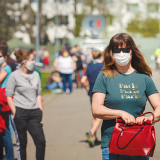Eurofound has carried out a large body of work on youth issues related to employment, quality of life and social cohesion. In light of the economic and social crisis following the COVID-19 pandemic, research continues to look at issues affecting young people in several topic areas, particularly employment and labour markets, living conditions and quality of life, as well as access to public services.
COVID-19 and its impact on young people
Eurofound’s unique e-survey, Living, working and COVID-19, provides an insight into the impact of the pandemic on people's lives, including young people, with the aim of helping policymakers shape the response to this crisis. Carried out in several rounds, it allows for comparison of the challenges facing young people during the different stages of living through the pandemic.
Building on this research, Eurofound has analysed the impact of COVID-19 on young people in the EU in terms of employment, their economic situation, social exclusion, mental well-being and trust in institutions. It also provides an overview of the policy measures put in place to reduce the economic and social impact of the pandemic on young people.
2008–2013 crisis and jobs
In the aftermath of the 2008–2013 crisis, EU unemployment soared to alarming levels, hitting 20% for those aged 15–29 and reaching even higher levels in individual Member States. With the help of the Young Guarantee and other measures, youth unemployment has recovered in recent years, finally reaching pre-crisis levels in 2019. But the questions remain as to where the jobs are and how young people can be helped, particularly those who are disengaged from the labour market over the long term. The reinforced Youth Guarantee will be crucial here in reacting to the COVID-19 crisis and in avoiding another sharp increase in youth unemployment. Eurofound's research provides a broad range of inputs to the development of youth policy, looking at:
- long-term unemployed youth
- start-up support for young people
- youth entrepreneurship in Europe
- mapping youth transitions in Europe
- youth and work and policy pointers aimed at improving this aspect of life for young people
- helping young workers during the crisis and the contributions of social partners and public authorities
- experiences of the Youth Guarantee in Finland and Sweden
- young people not in employment, education or training.
The focus of research has recently been adapted to examine the effects of COVID-19 on young people in Europe.
NEETs and exclusion
Alongside high unemployment, since 2008 the Member States have been dealing with the disproportionate impact of the recession on young people under 30, even those with higher levels of education. The number of those aged 15–29 who were not in employment, education or training (NEET) rose rapidly after 2008, but had been declining again since 2014, returning to pre-crisis levels by 2018. Yet the rates remained high in some Member States, particularly Italy and Greece. Eurofound seeks to understand the economic and social consequences of youth disengagement from the labour market and education.
Research on the impact of COVID-19 on young people has focused on the economic and social situation of young people at the onset of the pandemic, particularly NEETs. It describes the labour market participation of young people during the period 2007–2020 and discusses the characteristics and diversity of NEETs.
Some young people face particular difficulties in accessing employment: for example, those who have a disability or other health problem are 40% more likely of becoming NEET than others. A policy of active inclusion is seen as the most appropriate for addressing these difficulties. Eurofound has analysed active inclusion policy for young people with disabilities or health problems in 11 EU Member States.
Youth dimension in Eurofound’s surveys
The youth dimension is relevant across many areas of Eurofound research, including its surveys.
The Living, working and COVID-19 e-survey, carried out in several rounds in 2020 and 2021, explores the impact of the pandemic across age groups. Topics affecting young people include job loss and insecurity, mental well-being, social exclusion and optimism about the future, experiences with online education, trust in institutions and access to public services. The findings show that young people are again being hard-hit by the social and economic impacts of yet another crisis.
The European Quality of Life Survey (EQLS) 2016 found important differences between age groups in relation to quality of life, social inclusion, the quality of society and access to public services. EQLS data have also been used to compile a policy brief on the social situation of young people in Europe.
The European Working Conditions Survey (EWCS) 2010 revealed that some aspects of the working conditions of young workers (under 25) differ considerably from those of older workers. Data from the EWCS 2015 have shown that the skills gap between younger and older workers is gradually closing.
Eurofound’s COVID-19 survey used various questions from the EQLS and EWCS, adapting them where necessary for the purpose of the survey.






















